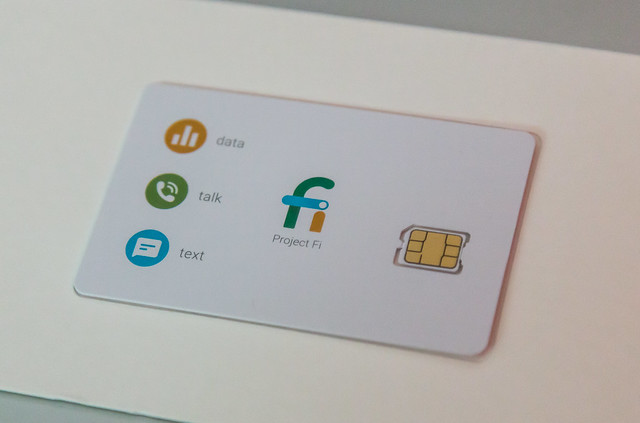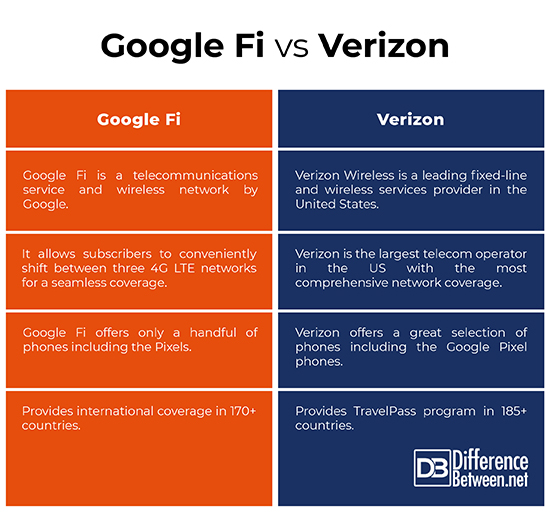Difference Between Google Fi and Verizon
We live in an era when potentially everything and everyone have a digital identity and is connected by a global network. This leads to the virtualization of devices, enterprises, homes, and the networks that connect them to the services they consume. Networking today has the potential to define a new phase of human existence and this technology-driven transformation is influenced primarily by technological forces that support new connectivity, computing, and consumption paradigms. Information and telecommunications revolution is one such major revolution that took mobile communications to a whole new level.
Google’s Project Fi, touted as an alternate wireless carrier, is perhaps the best evidence to date of the global communications revolution, with subscribers obtaining wireless service from Google. But this has got many curious souls wondering if Google Fi is any better than the existing wireless network carriers such as Verizon. Based on Google’s reputation and its long standing global presence, you might like the sound of Google Fi, but considering Verizon is the dominant wireless network in the United States, Verizon seems to be the obvious choice of network. Let’s see which one is the better network as we pit the two wireless carriers against each other.

What is Google Fi?
Formerly Project Fi, Google Fi is a telecommunications service and wireless network by Google that provides wireless services to subscribers based on local access provided through an ecosystem of local access providers. Touted as an alternate wireless carrier, Google announced the Project Fi in 2015 to become a mobile virtual network operator that combines Wi-Fi and cellular networks from different telecommunication providers to enable seamless connectivity and fast internet access. Google Fi leverages other carriers’ networks allowing subscribers to conveniently shift between three 4G LTE networks and connecting to over 2 million secure Wi-Fi hotspots as you move around places. It uses multiple networks to give you seamless access to fast internet in more places and better connections to Wi-Fi, providing best cellular and data coverage. And the best part, you only have to pay for the data you use.

What is Verizon?
Verizon Wireless is a leading fixed-line and wireless services provider in the United States with headquarters in New York City. It provides wireless products and services to a broad range of customers, including businesses and government agencies. The company was originally founded in 2000, when Bell Atlantic and Vodafone merged their US wireless operations to form Verizon Wireless. Verizon Communications was formed later that year upon approval of acquisition of the local phone company, GTE. Verizon started trading on the NYSE under the VZ symbol on July 3, 2000, and began trading on the NASDAQ exchange on March 10, 2010. The early development of LTE and the launch of the 4G service in December 2010, was a tremendous coup for Verizon Wireless. By the end of 2011, Verizon’s 4G LTE network reached 200 million subscribers in 195 markets across the United States. Over the years, Verizon has successfully established itself as one of the fastest-growing telecom operators in the world.
Difference between Google Fi and Verizon
Coverage for Google Fi and Verizon
– Verizon Wireless is a leading fixed-line and the largest wireless services provider in the United States with the most comprehensive network that expands its 4G network to most areas than any other telecom operator in the United States. As the largest wireless service provider in the US, Verizon has the majority of the nation covered in terms of network coverage. Google Fi, on the other hand, uses other carriers’ networks allowing subscribers to conveniently shift between three 4G LTE networks – T-Mobile, Sprint, or US Cellular – providing seamless coverage in more places.
Unlimited Plans
– Google Fi aims to keep things simple by providing consumer-friendly plans with no hidden fees. For $20 per month, you get unlimited talk and texting, but you have to pay $10 on top of that per gigabyte of data until you hit 6 GB without paying any extra. This is where the Google Fi’s Bill Protection kicks in which caps your monthly data charge at $60, keeping your data free for the rest of the month until you reach 15 GB, after which the speeds are reduced. Verizon, on the other hand, offers three unlimited plans, starting from a basic plan with unlimited talk and text and 500 MB data which costs $30 per month.
Phone Selection
– As the nation’s largest wireless service provider, Verizon offers a great selection of phones ranging from the Samsung’s latest Galaxy series phones to the latest iPhones to the more budget-friendly offerings from Motorola. Verizon is probably the only carrier outside the Google Fi network that sells Google’s flagship Pixel phones. Google Fi, on the other hand, is a relatively new service provider with only a handful of phones under its network portfolio, including the Pixels.
Extras
– Google Fi offers excellent coverage in more than 170 countries, with easy pay-as-you-go roaming plans that cost same as you’d pay for data at your home network. Plus users get free Netflix, courtesy of T-Mobile and access to music streaming service Tidal, thanks to Sprint. Conversely, Verizon’s TravelPass is an economical way to stay connected as you go outside the US in more than 185 countries, making traveling easier and cheaper. With TravelPass, you pay a flat rate, instead of paying per minute, or per MB or message. You will be charged $5 per day in Mexico and Canada, and $10 for other countries.
Google Fi vs. Verizon

Summary of Google Fi vs. Verizon
So which network is better – Google Fi or Verizon? Well, it all comes down to what device you’re using and what perks you are looking for when traveling abroad. Well, in terms of customer service, both Google Fi and Verizon compare favorably as both of them provide data-usage alerts, bill history, chat or text service, and more. Verizon, being the largest wireless service provider in the US, offers a great selection of phones through its comprehensive network that spans most areas than any other telecom operator in the United States. The unlimited plans of Google Fi are a true lifesaver, whereas Verizon’s postpaid plans are painstakingly expensive. If you are a frequent traveler, Google Fi is truly unmatched.
- Difference Between Serif and Sans Serif - April 22, 2024
- Difference Between HTML and Text - April 19, 2024
- Difference Between FTP and SFTP - April 16, 2024
Search DifferenceBetween.net :
 Email This Post
: If you like this article or our site. Please spread the word. Share it with your friends/family.
Email This Post
: If you like this article or our site. Please spread the word. Share it with your friends/family.
1 Comment
Leave a Response
References :
[0]Image credit: https://upload.wikimedia.org/wikipedia/commons/thumb/3/39/Verizon-Wireless-Logo.svg/500px-Verizon-Wireless-Logo.svg.png
[1]Image credit: https://www.flickr.com/photos/diversey/25109932164
[2]Seidenberg, Ivan. Verizon Untethered: An Insider's Story of Innovation and Disruption. New York City: Post Hill Press, 2018. Print
[3]Hill, Charles and Gareth Jones. Strategic Management: An Integrated Approach. Boston: Cengage, 2007. Print
[4]Weldon, Marcus K. The Future X Network: A Bell Labs Perspective. Boca Raton, Florida: CRC Press, 2018. Print


I have a Google Pixel 2 that I purchased in 2015. It is the summer of 2020 and my phone battery is just showing signs of battery fatigue. I have not been disappointed in any Google product that I have tried. It seems to me that they have proven that quality is paramount in their endeavors. For these reasons I am switching from Verizon (who I’ve been with since 2006) to Google FI; and since I really have loved my Pixel 2, I am going to upgrade to another Pixel. If the next phone performs as well, Google has a permanent customer.